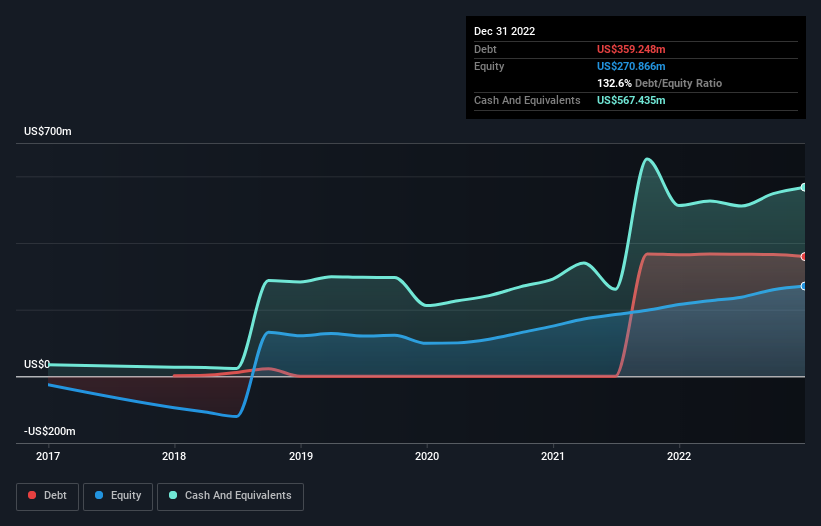
Some say volatility, rather than debt, is the best way to think about risk as an investor, but Warren Buffett famously said that 'Volatility is far from synonymous with risk.' So it might be obvious that you need to consider debt, when you think about how risky any given stock is, because too much debt can sink a company. We note that Tenable Holdings, Inc. (NASDAQ:TENB) does have debt on its balance sheet. But is this debt a concern to shareholders?
When Is Debt A Problem?
Debt and other liabilities become risky for a business when it cannot easily fulfill those obligations, either with free cash flow or by raising capital at an attractive price. Part and parcel of capitalism is the process of 'creative destruction' where failed businesses are mercilessly liquidated by their bankers. However, a more usual (but still expensive) situation is where a company must dilute shareholders at a cheap share price simply to get debt under control. Having said that, the most common situation is where a company manages its debt reasonably well - and to its own advantage. When we think about a company's use of debt, we first look at cash and debt together.
View our latest analysis for Tenable Holdings
How Much Debt Does Tenable Holdings Carry?
As you can see below, Tenable Holdings had US$359.2m of debt, at December 2022, which is about the same as the year before. You can click the chart for greater detail. But it also has US$567.4m in cash to offset that, meaning it has US$208.2m net cash.

How Strong Is Tenable Holdings' Balance Sheet?
The latest balance sheet data shows that Tenable Holdings had liabilities of US$584.2m due within a year, and liabilities of US$584.5m falling due after that. Offsetting this, it had US$567.4m in cash and US$187.3m in receivables that were due within 12 months. So its liabilities total US$413.9m more than the combination of its cash and short-term receivables.
Given Tenable Holdings has a market capitalization of US$4.97b, it's hard to believe these liabilities pose much threat. Having said that, it's clear that we should continue to monitor its balance sheet, lest it change for the worse. While it does have liabilities worth noting, Tenable Holdings also has more cash than debt, so we're pretty confident it can manage its debt safely. When analysing debt levels, the balance sheet is the obvious place to start. But it is future earnings, more than anything, that will determine Tenable Holdings's ability to maintain a healthy balance sheet going forward. So if you're focused on the future you can check out this free report showing analyst profit forecasts.
In the last year Tenable Holdings wasn't profitable at an EBIT level, but managed to grow its revenue by 26%, to US$683m. With any luck the company will be able to grow its way to profitability.
So How Risky Is Tenable Holdings?
While Tenable Holdings lost money on an earnings before interest and tax (EBIT) level, it actually generated positive free cash flow US$112m. So although it is loss-making, it doesn't seem to have too much near-term balance sheet risk, keeping in mind the net cash. The good news for Tenable Holdings shareholders is that its revenue growth is strong, making it easier to raise capital if need be. But that doesn't change our opinion that the stock is risky. There's no doubt that we learn most about debt from the balance sheet. But ultimately, every company can contain risks that exist outside of the balance sheet. For example - Tenable Holdings has 3 warning signs we think you should be aware of.
When all is said and done, sometimes its easier to focus on companies that don't even need debt. Readers can access a list of growth stocks with zero net debt 100% free, right now.
Valuation is complex, but we're here to simplify it.
Discover if Tenable Holdings might be undervalued or overvalued with our detailed analysis, featuring fair value estimates, potential risks, dividends, insider trades, and its financial condition.
Access Free AnalysisHave feedback on this article? Concerned about the content? Get in touch with us directly. Alternatively, email editorial-team (at) simplywallst.com.
This article by Simply Wall St is general in nature. We provide commentary based on historical data and analyst forecasts only using an unbiased methodology and our articles are not intended to be financial advice. It does not constitute a recommendation to buy or sell any stock, and does not take account of your objectives, or your financial situation. We aim to bring you long-term focused analysis driven by fundamental data. Note that our analysis may not factor in the latest price-sensitive company announcements or qualitative material. Simply Wall St has no position in any stocks mentioned.
About NasdaqGS:TENB
Tenable Holdings
Provides cyber exposure management solutions in the Americas, Europe, the Middle East, Africa, the Asia Pacific, and Japan.
Undervalued with excellent balance sheet.


